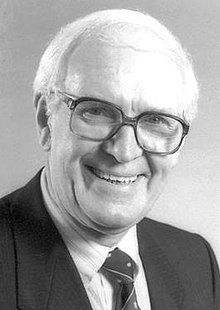Sir James Black
|
Sir James Black OM FRS FRSE FRCP |
|
|---|---|
 |
|
| Born | James Whyte Black 14 June 1924 Uddingston, Lanarkshire, Scotland |
| Died | 22 March 2010 (aged 85) London |
| Citizenship | British |
| Nationality | Scottish |
| Fields | Pharmacology |
| Institutions | |
| Alma mater | University of St Andrews |
| Known for | work towards the use of propranolol and cimetidine |
| Notable awards |
|
|
Website www |
|
Sir James Whyte Black OM FRS FRSE FRCP (14 June 1924 – 22 March 2010) was a Scottish pharmacologist. Black established a Veterinary Physiology department at the University of Glasgow, where he became interested in the effects of adrenaline on the human heart. He went to work for ICI Pharmaceuticals in 1958 and, while there, developed propranolol, a beta blocker used for the treatment of heart disease. Black was also responsible for the development of cimetidine, a H2 receptor antagonist, a drug used to treat stomach ulcers. He was awarded the Nobel Prize for Medicine in 1988 for work leading to the development of propranolol and cimetidine.
Black was born on 14 June 1924 in Uddingston, Lanarkshire, the fourth of five sons of a Baptist family which traced its origins to Balquhidder, Perthshire. His father was a mining engineer. He was brought up in Fife, educated at Beath High School, Cowdenbeath, and, at the age of 15, won a scholarship to the University of St Andrews. His family had been too poor to send him to university and he had been persuaded to sit the St Andrews entrance exam by his maths teacher at Beath.
...
Wikipedia
